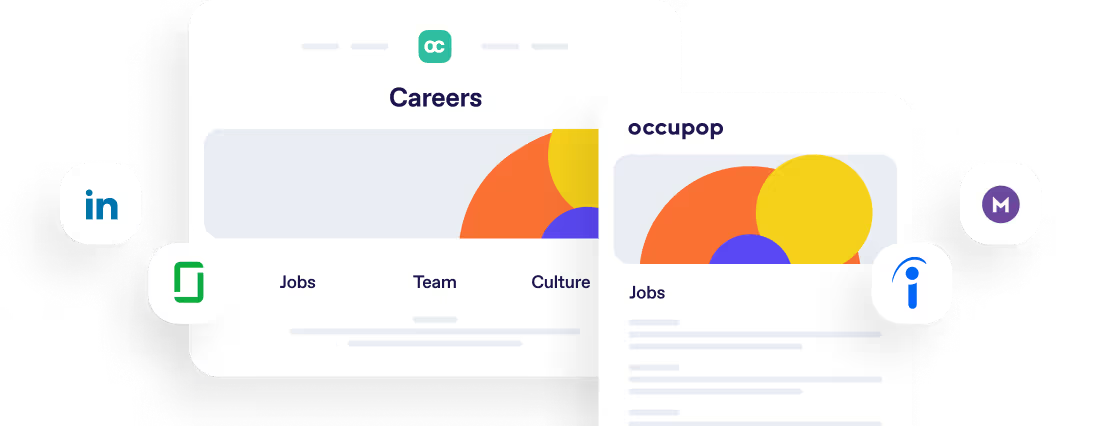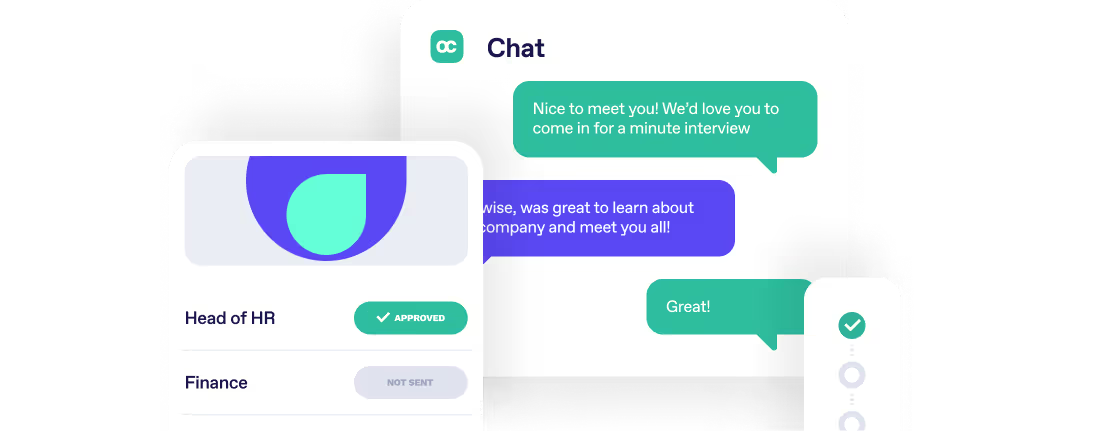Easy Ways to Improve Interviews When Recruiting



With an increased emphasis on the candidate experience during the recruitment process, the interview portion of recruiting is more important than ever.
The outcome at the end of the recruitment process can depend on the candidate’s preparation and previous working experience. But the candidate’s experience during the interview process can heavily depend on the skills of the interviewer and the interviewer questions they ask.
A skilled interviewer knows that conducting a job interview is more complex than asking the candidate a few questions and taking down their answers. There are a number of factors a quality interviewer needs to be able to juggle to conduct a great interview. Knowing how to conduct interviews that; flow well, answer all the necessary questions and establishes a personality fit, result in great hires, so it's something that is extremely worthwhile to master.
The importance of a good interviewer during the recruitment process is not only worthwhile from a hiring perspective, but is a valuable investment in training when considering business productivity. According to a Career Builder Survey, 74% of employers say they’ve hired the wrong person for a position. Therefore, to help you and your hiring team, we’ve narrowed down a few of what we consider to be the “Top Tips to Improve Your Interview Skills”.
Take a look at our tips and take steps to become a great interviewer!

Prepare and structure the interview
Interviewers need to prepare for interviews before conducting them! This seems like an obvious statement, but the issue with lack of preparation is the potential to go off track, and subsequently the answers provided by the candidate not being enough to determine their suitability for the position, through no fault of their own. This is why interviewers should follow a structured plan.
This involves a set of questions relating to the candidate persona that are planned in advance. These questions should be the same for all candidates who have applied to the role, to enable a fair process. Base the initial questions off the job description and the skills required. This will help determine which questions are integral to the hiring process, enabling questions to be asked that will demonstrate the compatibility of the candidate with the role.
As an aide, many interviewers create a checklist detailing what they need going into an interview. This varies depending on the job advertised, but as a rule of thumb it is best to:
• Study the candidate’s CV
• Review any previous work or sample work
• Review the job description and create candidate persona around this
• Prepare interview questions
Download our Ultimate List of Hiring Manager Interview Questions to help you with this!
Welcome the candidate, don’t intimidate them.
Interviews can be intimidating experiences for candidates. The daunting process of being judged by one or more hiring managers can be a crippling experience for some. According to a LinkedIn Talent trends Report in 2015, 83% of talent stated that a negative interview experience could change their mind about a role or a company they once liked.
Help in setting the candidate up for success!
How they perceive an interviewer in the initial greetings can set the tone of how the interview will proceed. Be warm. Be welcoming. Lose the stiffness, whilst maintaining the formality of an interview setting. A smile, a handshake, introduction pleasantries and offering them something to drink can go a long way in making the candidate feel at ease.
Everyone in the room is still human after all.
Pitch to the candidate, as the candidate pitches to you.
While many candidates will do their research on companies prior to an interview, they will generally only have the website or review sites like Glassdoor or Indeed to be able to research the company in depth. With that in mind, good practice for an interviewer is to introduce who they and any other fellow interviewers are, then, the company and the position which the candidate has applied. This gives the candidate more insight into the running of the company and the role, possibly affecting their subsequent answers and delivering a more positive outcome.
In an interview, both the interviewer and candidate are trying to sell each other. While the candidate is selling their skills, experience and personal fit, the interviewer needs to be actively selling the company. Candidates are trying to determine whether they want to work for the company as much as the interviewers are determining whether they’re right for the company.
So practice your pitch.
Give details on the company; the company values, how it actively seeks to engage and support its employees, the expectations of its employees and what challenges someone in the role might face. The more information the candidate has, the more in line their answers can be with what the company is looking for.
INSERT-CTA
Take notes. Lots of them.
As candidates relay their knowledge of the company, information about themselves and their experience; it can be a lot for an interviewer to take in. It can be even harder if they are not making note of the important things, with the more valuable pieces of information, those not written on a resume, getting lost.
Make sure to take notes. Out of respect for the candidates time and effort, and to make things easier when passing on recommendations or narrowing the selection down once the interview process is complete.
Make sure to use a paper instead of a laptop. The tapping sound and physical barrier of the computer can be off-putting to some candidates. While taking notes is important, a candidate still wants to know that you’re engaged.
In addition to this, knowing a little bit about the candidate’s background can help in preempting what information you will need to take note of. Familiarising yourself with this can help, should you need to go back to any previously mentioned points during the interview.
Leave your bias at the door.
Every candidate is different and every candidate should be treated so. Avoid falling into a trap of comparing and contrasting other candidates, or what you assume the ideal candidate should be. Keep an open mind. Try to avoid bias, unconscious or not.
Not everyone fits into a box. Not everyone has the same background, skills or education. While hiring managers need to scout for talent that looks great on paper, it doesn’t necessarily mean candidates should be written off based on factors such as, where they went to school.
Additionally, make sure to actively listen to what a candidate is saying, don’t base your opinion on misunderstanding. If necessary, rephrase, clarify and check that you have understood them.
Often interviewers make an assumption about a candidate within the first few minutes. Let the interview happen. Look back over your notes later and then form an opinion, a person shows you who they are if you let them. You’ll never know who could surprise you!

End on a high note
Candidates can often feel left in the dark at the end of an interview, often pondering what is next in the recruitment process. As interviews can be an intimidating experience, they can also feel flustered, not knowing what questions to ask.
Interviewers ideally will be able to preemptively know what candidates may want to ask and provide them with the necessary information or guidance. Common questions include; “What’s the next stage?”, “When will I hear regarding the outcome?” and “Is there anything else you need or would like to know about me?”. These are questions every interviewer should be expecting, so if the candidate seems like they’re at a blank, help them out. Give them what they need to know, regardless if after the interview they don’t progress any further within the recruitment process.
Make sure there is enough time scheduled during the interview for any questions and answers the candidate would like to explore. The candidate wants to leave the interview feeling satisfied that they’re fully familiarised with the recruitment process of which they’re currently in, and that they were able to ask everything they could.
While interviews can be tricky with the right skills you can easily lead a great interview.
INSERT-LINE
If you’re worried about interviewing the right candidates take some time to review Occupop; recruiting software for HR & Hiring Managers. We have A.I. technology that assists you with screening candidates so that you can focus on the important stuff; delivering a winning interview process. Check out our website www.occupop.com or click on the link below to get started for free now, no credit card required!
If you liked this article, why not subscribe below to get more tips and updates directly to your inbox? We only send the most relevant industry insights and don’t worry, just like you, we hate spam!
Summary Points
With an increased emphasis on the candidate experience during the recruitment process, the interview portion of recruiting is more important than ever.
- Prepare and Structure the Interview
- Welcome the Candidate, Don’t Intimidate them
- Pitch to the Candidate, as the Candidate Pitches to You
- Take Notes. Lots of them
- Leave Your Bias at the Door
- End on a High Note
Simple. Beautiful.
Recruitment Software.
HR updates sent straight to your inbox
You might also like...


Manage your entire hiring process simply, from engagement to management, hiring and onboarding







Simple. Beautiful.
Recruitment Software.
Recruitment Software.






